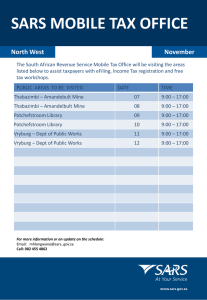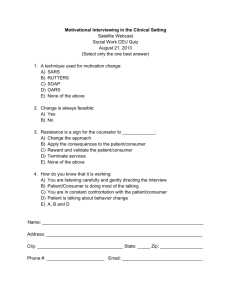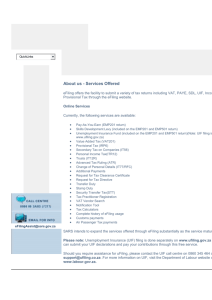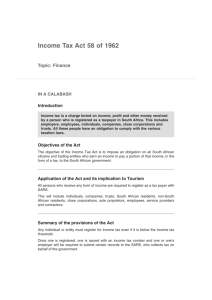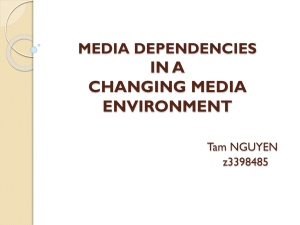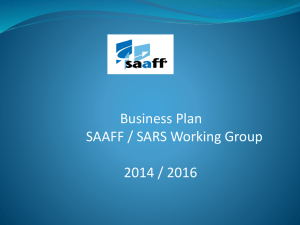what to do with your irp5 – 2013 year of assessment
advertisement
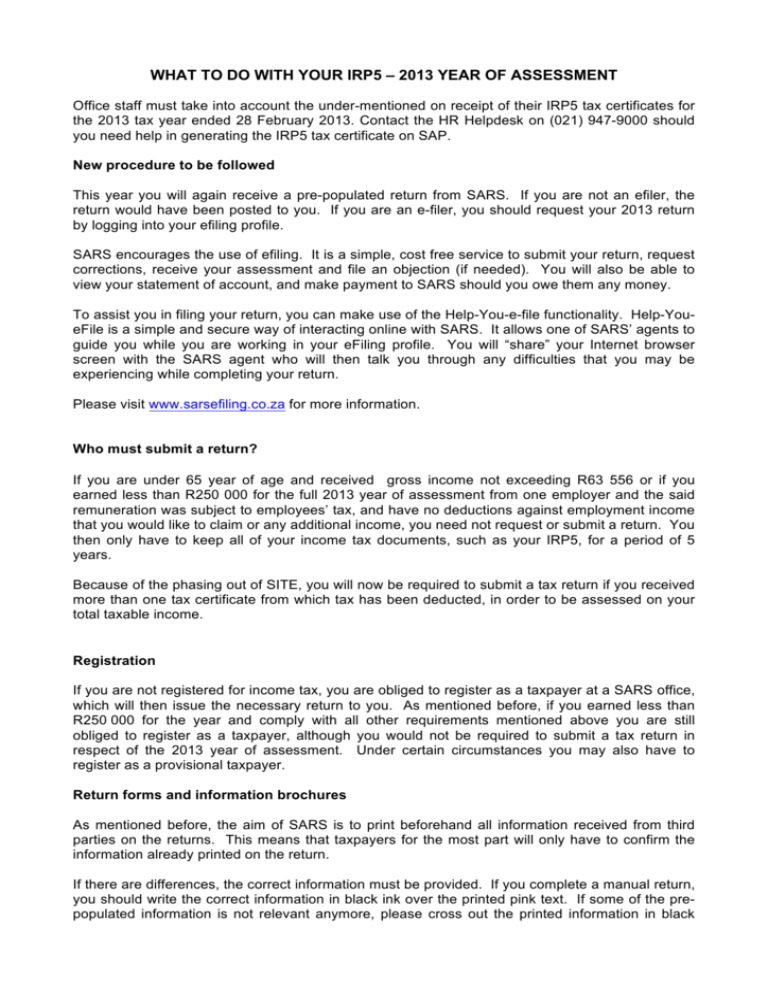
WHAT TO DO WITH YOUR IRP5 – 2013 YEAR OF ASSESSMENT Office staff must take into account the under-mentioned on receipt of their IRP5 tax certificates for the 2013 tax year ended 28 February 2013. Contact the HR Helpdesk on (021) 947-9000 should you need help in generating the IRP5 tax certificate on SAP. New procedure to be followed This year you will again receive a pre-populated return from SARS. If you are not an efiler, the return would have been posted to you. If you are an e-filer, you should request your 2013 return by logging into your efiling profile. SARS encourages the use of efiling. It is a simple, cost free service to submit your return, request corrections, receive your assessment and file an objection (if needed). You will also be able to view your statement of account, and make payment to SARS should you owe them any money. To assist you in filing your return, you can make use of the Help-You-e-file functionality. Help-YoueFile is a simple and secure way of interacting online with SARS. It allows one of SARS’ agents to guide you while you are working in your eFiling profile. You will “share” your Internet browser screen with the SARS agent who will then talk you through any difficulties that you may be experiencing while completing your return. Please visit www.sarsefiling.co.za for more information. Who must submit a return? If you are under 65 year of age and received gross income not exceeding R63 556 or if you earned less than R250 000 for the full 2013 year of assessment from one employer and the said remuneration was subject to employees’ tax, and have no deductions against employment income that you would like to claim or any additional income, you need not request or submit a return. You then only have to keep all of your income tax documents, such as your IRP5, for a period of 5 years. Because of the phasing out of SITE, you will now be required to submit a tax return if you received more than one tax certificate from which tax has been deducted, in order to be assessed on your total taxable income. Registration If you are not registered for income tax, you are obliged to register as a taxpayer at a SARS office, which will then issue the necessary return to you. As mentioned before, if you earned less than R250 000 for the year and comply with all other requirements mentioned above you are still obliged to register as a taxpayer, although you would not be required to submit a tax return in respect of the 2013 year of assessment. Under certain circumstances you may also have to register as a provisional taxpayer. Return forms and information brochures As mentioned before, the aim of SARS is to print beforehand all information received from third parties on the returns. This means that taxpayers for the most part will only have to confirm the information already printed on the return. If there are differences, the correct information must be provided. If you complete a manual return, you should write the correct information in black ink over the printed pink text. If some of the prepopulated information is not relevant anymore, please cross out the printed information in black 2 ink. If you complete your return via eFiling please do the required changes on the screen and save the return. Please note that if, for instance, you receive rental income, you must still declare the rental income on the return. The SARS would not have been able to obtain that information from a third party, and therefore the responsibility will still be on you to disclose in full your taxable income for the year on the return. After correcting any incorrect information on the return, or if the printed information was correct, please sign the return and either post it to SARS in the self-addressed postage paid envelope or deliver it to a SARS branch. Please do not fold the return when submitting it, as this will delay the processing of your return by SARS. Please, also note that unsigned returns will not be accepted as submitted and will be returned by SARS. Taxpayers making use of eFiling to submit their returns do not sign their returns. Logging onto the eFiling system with your unique username and password serves as declaration by the taxpayer that the information provided is correct. To submit the return electronically, simply click the “File” button on eFiling. Although the supporting documentation required to complete the return need not be attached when the return is submitted, you must keep the documentation for a period of 5 years after having submitted the return. SARS may request the documentation at any time during the 5 year period. General hints for completing your return Ø General: Use a black pen to write over the information printed in pink if you need to change any pre-populated information. Use capital letters and do not be concerned if some of the pink lettering is still displayed where the correction in black has been made. SARS will ignore the pink information if it has been written over in black. Write the word or number in full and do not only change one letter of a name or one digit of a number, but re-write the full name or number. If you have to delete populated information that is no longer applicable, do so by putting a horizontal line through the middle of the incorrect characters in the field. Do not complete any information outside the field provided and do not make any notes in the margin. Such information will not be considered as valid and will not be taken into account in the calculation of the assessment. If a certain section of the return that was issued to you does not apply, please leave the fields blank - do not write “N/A”, do not enter a zero or strike through the spaces that do not apply. Ø Original return: The income tax return issued to you (via mail or eFiling) contains a unique printed barcode for purposes of capturing and storing the return by SARS. Therefore, only the original completed return may be returned to SARS. No copies or self-generated forms will be accepted. Ø Personal details: Ensure that your details are reflected under “contact details” and not those of your tax practitioner (if you used a tax practitioner). There is a specific section that needs to be completed with the tax practitioner’s details if your return was submitted on your behalf by a tax practitioner. Ø Bank account detail: SARS does not issue cheques for refunds. All refund payments will be done electronically, and therefore you need to confirm that SARS has your correct banking details. Please note that SARS will not pay any refunds into an account of a third party. Therefore, tax practitioners’ banking details may not be used as the taxpayers’ banking details. You can change your banking details online. If the automated validation fails, you will be required to visit your nearest SARS branch in person for the verification process to be completed. Please refer to the SARS website or the External Guide on “How to complete your 3 individual income tax returns ITR12” for the list of documentation that must be submitted in order for the banking detail to be changed. In order to protect taxpayers against fraud, SARS prints only the last four digits of your bank account number on the return. Therefore, only correct the bank details (in full) if the last four digits do not correspond with your own bank account number. Ø Medical Aid contributions paid by Sanlam (code 3810): This amount represents the total amount paid by Sanlam to the fund for your benefit. Also refer to the paragraph regarding medical expenses below.. Ø Main source of income: The description and code for Sanlam employees should be “Finance, insurance, real estate and business services” (source code 2520). Ø Medical expenses: As from 1 March 2012 the deduction for medical scheme contributions was replaced with a medical scheme fees tax credit. Taxpayers who are members of a registered medical scheme and are younger than 65 years, will be entitled to a monthly tax credit in respect of medical scheme contributions made. The monthly medical scheme tax credit for the 2013 tax year is as follows: Ø R230 - in respect of your contribution Ø R230 in respect of the first dependant’s contribution Ø R154 in respect of each additional dependants contribution It is very important that you complete the correct number of members of the medical scheme (including yourself) in the Medical Deduction Section of the return, as SARS will use that information to calculate the total credit that you are entitled to. The deduction for medical expenditure incurred and not recouped from your medical scheme is still available. However, bear in mind that not all expenditure incurred will be deductible. There is a special calculation with a cap that needs to be done to determine the deduction. All you need to do is record the amount of qualifying medical expenditure incurred that was not recouped from your medical aid (next to code 4020 on the return), and SARS will calculate any deduction that you may be entitled to. Please also note that for the 2013 tax year, the treatment of medical scheme contributions for persons over 65 years did not change. They still have a deduction for contributions made, and all medical expenditure incurred will be allowed as a deduction against taxable income (the calculation and the cap mentioned above does not apply to the over 65 year old taxpayers). Ø Current pension fund contributions: Your actual member contribution during the year is indicated under code 4001. Ø Current retirement annuity fund contributions: The amount indicated on the IRP5 under code 4006 is the contribution carried by the salary system and taken into account for purposes of monthly tax calculations. You must, however, base the deduction that you claim in the return on the actual contribution as indicated on the contribution certificate(s) issued by the respective funds. Please note that the mere fact that the amount appears on your tax certificate, does not mean that the deduction will be allowed on assessment. You must complete the contributions made as a deduction on the return next to code 4006. Only then it will be taken into account on assessment. 4 Ø Income Protection Insurance Contribution: The amount reflected on your tax certificate next to code 4018 should be completed here. You should receive a certificate from the institution to which the contributions were made. This certificate will be available at a later stage and we will communicate again once the certificates are available. Do remember to complete the questionnaire on the first page of the ITR12 on efiling, correctly. This questionnaire will create a customised return. One of the questions relates to contributions made to a retirement annuity fund. You must please answer “yes” to this question, even if you do not make contributions to a retirement annuity fund. As a permanent employee of Sanlam, you make contributions to an income protection insurance policy, and you need to reflect the contributions made on your customised return in order to get an income tax deduction for the contributions made. The field in which you need to reflect the contributions made (code 4018) will only be reflected in your customised return, if you answer the question in respect of retirement annuity fund contributions “yes”. Please note that the mere fact that the amount appears on your tax certificate, does not mean that the deduction will be allowed on assessment. You must complete the amount as a deduction on the return for it to be taken into account on assessment. Background for dealing with allowances and fringe benefits Ø Travel allowance: The travel allowance amount represents your travel allowance excluding any kilometre claims paid to you in cash in addition to your travel allowance. This amount is included in your gross remuneration, but only 80 % of the allowance was subjected to employees’ tax during the year of assessment. You may therefore have a tax liability on assessment if your claim in respect of travelling expenses is insufficient. SARS requests information about the vehicle, kilometres travelled and whether or not accurate record was kept of business kilometres travelled. SARS will then use the information provided to calculate your claim for business travel expenses. The total amount of the claim would be reflected on your assessment as a deduction against your travel allowance. Ø Reimbursive travel allowance (codes 3702 and 3703): Any kilometre claims paid to you in respect of business-related travelling will appear under one of these codes. No tax will have been deducted against these amounts, but in your tax return you will be required to substantiate a claim for travelling expenses against any amount appearing under code 3702 or 3703. To the extent that you cannot do this, the remaining amount, together with any unclaimed amounts under code 3701, will be subject to tax at assessment. Ø Share options exercised (code 3707): Participants in the Sanlam Limited Share Incentive Scheme will receive a separate letter from the scheme administrator on how to deal with any taxable amounts arising from options exercised by them during the 2013 year of assessment. Ø Right to use of motor vehicle (code 3802): The taxable value of your company car(s) is indicated here. If you travelled less than 10 000 kilometers for private purposes during the year of assessment and you kept a logbook of the private kilometres travelled, you may qualify for a decrease in the fringe benefit. However, you would need to substantiate the amount of private kilometres travelled and SARS may request a copy of the logbook. Completion of your return Upon receipt of your tax assessment, you need to verify the taxable income calculated by SARS. If you do not agree with your assessment, you need to follow one of the following options: • if the mistake is a simple typing error then you simply complete and submit a Request for Correction form; 5 • if the information is correct, but you disagree with the principles followed by SARS in calculating your taxable income (i.e. disallowance of a deduction or SARS’ interpretation of a specific section of the Act) you need to lodge a Notice of Objection. Both these forms would be available on eFiling or at a SARS branch. You will also receive an updated statement of account with your assessment that will reflect the recent history of your account with SARS, as well as any short payment of tax or refund due in respect of your 2013 assessment. If you do not use eFiling to submit your return, the last day for submission is 27 September 2013. The submission date for non-provisional taxpayers who choose to make use of eFiling is 22 November 2013. Provisional taxpayers who submit their returns via eFiling have until 31 January 2014. Please note that SARS will charge a late submission penalty if your return is submitted after the above-mentioned dates. Remember Ø To complete all parts of the return in full as an incomplete return will be returned to you, and could result in a penalty being charged for late or non-submission of a return; Ø To sign your return before posting or delivering it to SARS if you submit the return manually; Ø To file all tax certificates (both IRP5 and IT3(a), (b) and (c)) issued to you with regard to the 2013 year of assessment, for a period of five years after the date of submission of your return for possible queries from the SARS; Ø To make complete copies of your return before submitting it if you submit manually, in case your return is lost; and Ø To compare your tax assessment with your return when you receive it.
